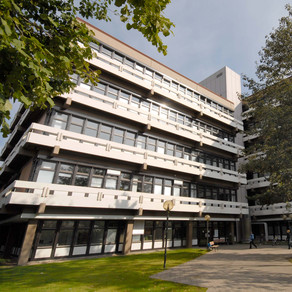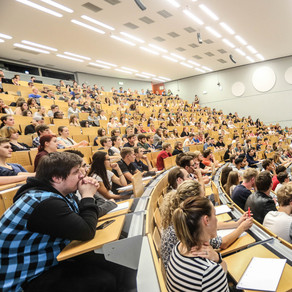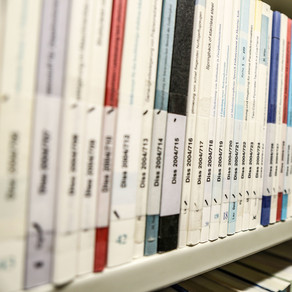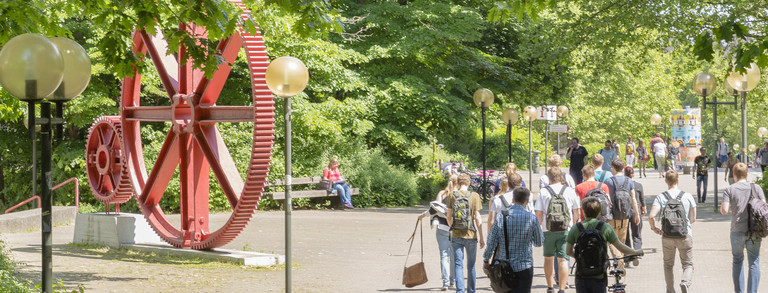Prof. Dr. Florian J. Boge
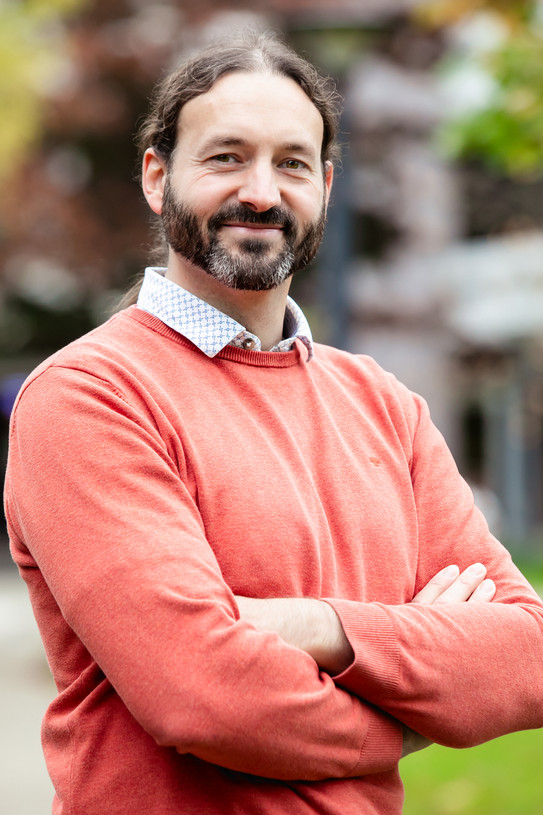
Telefon: (+49) 231-755-2883
Postadresse
Emil-Figge-Straße 50
44227 Dortmund
Deutschland
Campus Adresse
Campus Nord
EF50
Raum 2.247
Sprechzeiten: Mittwochs, 12:00-13:00
Die Sprechstunde findet nach Absprache in Person in meinem Büro oder über Zoom statt. Melden Sie sich bitte per E-Mail bei mir an.
Wissenschaftliche Mitarbeiter*innen:
Wissenschaftliche und studentische Hilfskräfte:
Weblinks
Vita
Florian J. Boge studied philosophy, linguistics and physics in Bonn, Düsseldorf, Cologne and Oxford. He received his PhD from the University of Cologne in 2017 for a thesis on the interpretation of quantum physics. He also holds a degree in physics (BSc) and has been on two research stays; one at Oxford University (2016) and one at the Stellenbosch Institute for Advanced Study in South Africa (2018).
Currently, he is Professor for Philosophy of Science with a Focus on Artificial Intelligence at TU Dortmund. He works on the philosophy of AI in relation to the epistemology of science, general issues in philosophy of science, the philosophy of simulation, and philosophy of physics. His main interests are the impact of AI on scientific understanding; scientific (anti-)realism; the philosophy of modelling and simulation; and the foundations of quantum physics. He is the group leader of the DFG-funded Emmy Noether junior research group UDNN: Scientific Understanding and Deep Neural Networks, associated PI at the Lamarr Institute for Machine Learning and Artificial Intelligence, and associate editor at the European Journal for Philosophy of Science.
Before coming to Dortmund, Florian was a postdoctoral researcher in the project The Impact of Computer Simulations and Machine Leaning on the Epistemic Status of LHC Data, a sub-project of the interdisciplinary DFG research unit The Epistemology of the Large Hadron Collider. He also filled a part-time interim professorship at Wuppertal University in 2022/23.
- Seit 04/2023 Juniorprofessor für Wissenschaftsphilosophie mit dem Schwerpunkt Künstliche Intelligenz am Institut für Philosophie und Politikwissenschaft der TU Dortmund
- 2022/2023: Vertretung (50%) der Professur für Wissenschaftsphilosophie an der Bergischen Universität Wuppertal
- 2017-2023 wissenschaftlicher Mitarbeiter an der Bergischen Universität Wuppertal und der RWTH Aachen, in der DFG-Forschungsgruppe „The Epistemology of the Large Hadron Collider“
- 2018 Visiting scholar am Stellenbosch Institute for Advanced Study (STIAS), Stellenbosch, ZA
- 2017 Promotion mit der Arbeit „Quantum Mechanics Between Ontology and Epistemology“, Universität zu Köln
- 2013-2016 BSc in Physik an der Universität zu Köln
- 2016 Visiting scholar & recognised student an der University of Oxford, UK, im Rahmen eines a.r.t.e.s/ DAAD-Stipendiums
- 2008-2012 MA in Philosophie an der Heinrich-Heine-Universität Düsseldorf
- 2006-2008 BA in Philosophie und Linguistik an der Heinrich-Heine-Universität Düsseldorf
- 2005 Studium der Philosophie, Vor- und Frühgeschichte und Skandinavistik an der Rheinischen Friedrich-Wilhelms-Universität Bonn
Forschungsschwerpunkte
Lehre
Theoretische Philosophie, insbesondere Wissenschaftsphilosophie und Philosophie der Künstlichen Intelligenz, aber auch Erkenntnistheorie, Metaphysik, Philosophie des Geistes sowie Philosophie der Gegenwart.
Forschung
Künstliche Intelligenz und wissenschaftliches Verstehen, wissenschaftlicher (Anti-)Realismus, Erkenntnistheorie der (Computer-)Simulation, Grundlagen der Quantenphysik, Erkenntnistheorie & Metaphysik der Wissenschaften
Emmy Noether-Gruppe UDNN: Scientific Understanding and Deep Neural Networks
Publikationen
2. Machine Learning and the Progress of Science, Cambridge Elements in Philosophy of Science, Cambridge University Press (under contract)
1. Quantum Mechanics Between Ontology and Epistemology, European Studies in Philosophy of Science Vol. 10, Springer (2018)
2. Special Issue: Machine Learning: Prediction Without Explanation?, Minds and Machines, 32(1), co-edited with R. Hillerbrand and P. Grünke
1. Topical Collection: Simplicity Out of Complexity? Physics and the Aims of Science, Synthese, co-edited with M. Á. Carretero Sahuquillo, P. Grünke, and M. King
27. Understanding (and) Machine Learning’s Black Box Explanation Problems, in Curtis-Trudel, A., Barack, D., and Rowbottom, D. P. (eds), The Role of Artificial Intelligence in Science: Methodological and Epistemological Studies, Routledge (forthcoming).
• preprint version
26. Machine Learning Discoveries and Scientific Understanding in Particle Physics: Problems and Prospects, together with Henk W. de Regt, in: Duran, J. M., and Pozzi, G. (Eds.), Philosophy of Science for Machine Learning, Synthese Library, Springer (forthcoming)
• preprint version
25. Der Einfluss Künstlicher Intelligenz auf die wissenschaftliche Erkenntnis und die Rolle der Technikphilosophie: Eine wissenschaftsphilosophische Perspektive, Jahrbuch Technikphilosophie (forthcoming)
24. Rethinking Holism and Underdetermination, Synthese (forthcoming)
• accepted manuscript
23. How can we Trust Opaque Systems? Criteria for Robust Explanations in XAI, together with A. Schuster, 2025 International Joint Conference on Neural Networks (IJCNN), Rome, Italy (2025)
• preprint version
22. Put it to the Test: Getting Serious About Explanation in Explainable Artificial Intelligence, with A. Mosig, Minds and Machines, 35(26), doi: 10.1007/s11023-025-09724-1 (2025)
21. Models: Measuring or Cognitive Instruments? Journal for General Philosophy of Science, doi: 10.1007/s10838-025-09733-9 (2025)
20. Re-Assessing the Experiment / Observation-Divide, Philosophy of Science, doi: 10.1017/psa.2024.23 (2024)
19. Causality and Scientific Explanation of Artificial Intelligence Systems in Biomedicine, with Axel Mosig (1st author), European Journal of Physiology, doi:10.1007/s00424-024-03033-9 (2024)
18. Functional Concept Proxies and the Actually Smart Hans Problem: What’s Special About Deep Neural Networks in Science, Synthese, 203(16), doi: 10.1007/s11229-023-04440-8 (2024)
17. The Positive Argument Against Scientific Realism, Journal for General Philosophy of Science, 54, 535–566, doi: 10.1007/s10838-022-09636-z (2023)
• accepted manuscript version
16.Back to Kant! QBism, Phenomenology, and Reality from Invariants, in: Berghofer, P. and Wiltsche, H. A. (Eds.), Phenomenology and QBism: New Approaches to Quantum Mechanics, Routledge (2023)
• preprint version
15. Two Dimensions of Opacity and the Deep Learning Predicament, Minds and Machines, 32(1), pp. 43-75, doi: 10.1007/s11023-021-09569-4 (2022)
14. A Brief Historical Perspective on the Consistent Histories Interpretation of Quantum Mechanics, together with G. R. Rocha and D. Rickles. Forthcoming in: Olival Freire Junior (Ed.), Oxford Handbook of the History of Quantum Interpretations, OUP (2022)
• preprint version
13. Realism Without Interphenomena: Reichenbach’s Cube, Sober’s Evidential Realism, and Quantum Solipsism, International Studies in the Philosophy of Science, 33(4), pp. 231-246, doi:10.1080/02698595.2021.1964335 (online 2021)
• accepted manuscript version
12. Why Trust a Simulation? Models, Parameters, and Robustness in Simulation-Infected Experiments, British Journal for the Philosophy of Science, doi: 10.1086/716542 (online 2021)
• preprint version
11. Incompatibility and the Pessimistic Induction: A Challenge for Selective Realism, European Journal for Philosophy of Science, 11(2), 46, doi: 10.1007/s13194-021-00367-4 (2021)
10. Quantum Reality: A Pragmaticized Neo-Kantian Approach, Studies in History and Philosophy of Modern Physics, 87, pp. 101-113, doi: 10.1016/j.shpsa.2021.03.009 (2021)
• accepted manuscript
9. Polycratic Hierarchies and Networks: What Simulation-Modeling at the LHC can Teach us About the Epistemology of Simulation, together with C. Zeitnitz, Synthese, 199(1-2), 445–480, doi: 10.1007/s11229-020-02667-3 (online 2020)
8. Computer Simulations, Machine Learning and the Laplacean Demon: Opacity in the Case of High Energy Physics, together with P. Grünke, forthcoming in Resch, Kaminski, and Gehring (Eds.), The Science and Art of Simulation II, Springer (accepted 2020)
• preprint version
7. How to Infer Explanations From Computer Simulations, Studies in History and Philosophy of Science, 82, pp. 25-33, doi: 10.1016/j.shpsa.2019.12.003 (online 2019)
6. Is the Reality Criterion Analytic?, together with D. Glick (first author), Erkenntnis, 86(6), pp. 1445-1451, doi: 10.1007/s10670-019-00163-w (online 2019)
• preprint version
5. Quantum Information vs. Epistemic Logic: An Analysis of the Frauchiger-Renner Theorem, Foundations of Physics, 49(10), pp. 1143-1165, doi: 10.1007/s10701-019-00298-4 (2019)
• preprint version
4. The Best of Many Worlds, or, is Quantum Decoherence the Manifestation of a Disposition? Studies in History and Philosophy of Modern Physics, 66, pp. 135-144, doi: 10.1016/j.shpsb.2019.02.001 (2019)
• preprint version
3. Why Computer Simulations are not Inferences, and in What Sense They are Experiments, European Journal for Philosophy of Science, 9(13), doi: 10.1007/s13194-018-0239-z (2019)
2. An Argument Against Global No Miracles Arguments, Synthese, 197(10), 4341-4363, doi: 10.1007/s11229-018-01925-9 (online 2018)
• open view-only version
1. Tropes With a Kantian Flavor. A Solution to Russell’s Regress, Conceptus, 41(99-100), pp. 123-134, doi: 10.1515/cpt-2014-0008 (2014)
5. Invited book review: Hilbert Space Gone Bananas (Again). Michael Janas, Michael E. Cuffaro and Michel Janssen: Understanding Quantum Raffles, Metascience, doi: 10.1007/s11016-022-00801-0 (online 2022)
4. Meeting report: Machine Learning and the Future of Scientific Explanation, together with M. Poznic, Journal for General Philosophy of Science 52(1), 171–176, doi: 10.1007/s10838-020-09537-z (2021)
3. Meeting report: Interdisciplinary Perspectives on Particle Physics, together with A. Wüthrich, CERN Courier 59(1), pp. 18–19 (2019)
2. Simon Friederich: Interpreting Quantum Theory: A Therapeutic Approach, Erkenntnis 82(2), pp 443–449, doi: 10.1007/s10670-016-9823-9, (2017)
1. ψ-Epistemic Models, Einsteinian Intuitions, and No-Gos. A Critical Study of Recent Developments on the Quantum State, PhilSci Archive:12048, arXiv:1603.09463 [quant-ph] (2016)
7. Künstliche Intelligenz in der philosophischen Hochschullehre – Gefahr, Herausforderung und Chance, https://lehrgut.org/ (2025)
6. Introduction: simplicity out of complexity? Physics and the aims of science, together with M. Á. Carretero Sahuquillo, P. Grünke, and M. King, Synthese, doi: 10.1007/s11229-023-04126-1 (2023)
5. Machine Learning: Prediction Without Explanation? together with P. Grünke and R. Hillerbrand, Minds and Machines, 32(1), pp. 1-11, doi: 10.1007/s11023-022-09597-8 (2022)
4. Tune in and Find Out: Why it may be epistemically acceptable to tune models for experimental
analysis , BJPS Short reads, no. 15 (online 2022)
• audio version
3. Correction to: An Argument Against Global No Miracles Arguments, Synthese, doi: 10.1007/s11229-020-02586-3 (online 2020)
2. BSc thesis: On Probabilities in the Many Worlds Interpretation of Quantum Mechanics, Cologne University Publication Server, urn:nbn:de:hbz:38-68892 (2016)
1. Translation of Doppelt, Gerald D., The Value-Ladeness of Scientific Knowledge, into German, in: Carrier, M. and Schurz, G. (eds.) Werte in den Wissenschaften, Suhrkamp (2013)







